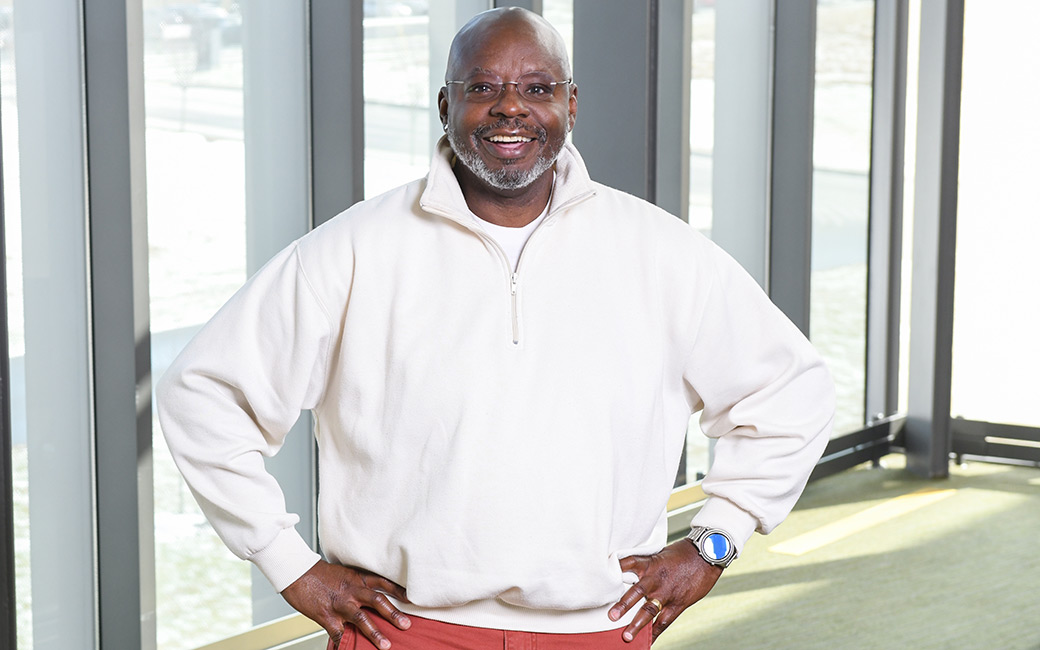His dream never died
John Carey Jr. found a supportive community at TU in Northeastern Maryland.
By Jan Lucas on December 18, 2017

For two years he lived in a car, tormented by undiagnosed mental illness.
This week John Carey Jr., 62, graduates with a B.S. degree in psychology from Towson University in Northeastern Maryland (TUNE). He not only excelled academically there but also became a friend and role model to students young enough to be his grandchildren.
Now he looks forward to graduate school and a career dedicated to helping others who are as down on their luck as he was half a lifetime ago.
“ My time at TUNE really invigorated me. Everyone treated me with respect and dignity, and there was never a discouraging word. It was always a pleasure to be there. ”
Carey enlisted in the Navy in 1976 and served as an air controller aboard an aircraft carrier. He left 12 years later with an honorable discharge and mental-health issues he attributes to extreme stress. Not long afterward he landed on the streets of Huntington, West Virginia, far from his Baltimore roots.
He slept in his car when the weather was decent and took refuge at a shelter when nighttime temperatures neared zero. Driving other homeless people to the liquor store or hospital provided a meager income.
Most of the time, he hid. “I was really afraid,” he explains. “I didn’t know what was wrong with me.”
After two years of homelessness, Carey decided to visit the local Veterans Administration (VA) hospital. There, he says, a VA social worker turned his life around. “She got me into a veterans’ shelter,” he recalls. “I was diagnosed with severe manic depression and agoraphobia (fear of public places).”
With medical care and VA supervision, Carey was able to get a job and a disability check from the federal government.
It was a huge improvement, but he wanted more.
While on shore leave in the Navy, he’d earned an associate degree from a California community college. By 1993 Carey felt his life was stable enough to return to the classroom. He transferred to Marshall University in Huntington and declared a major in education.
Doubts set in after three years. “I had concerns about whether I’d be able to teach with my disability,” Carey says of his decision to leave Marshall without graduating.
The years that followed included a major medical setback. But Carey never gave up on higher education, and by 2016 he was ready to try again. Now living in Bel Air, Maryland, with his husband, he applied to TUNE, this time with the goal of following in the footsteps of those who’d reached out to him in his darkest hour.
“I’d already taken a lot of psychology courses, and most of my credits transferred,” he says. “I also had the support of Kim Skelley, a VA psychologist who has encouraged me in every imaginable way.
“They say people major in psychology because they want to understand themselves better,” Carey says with a chuckle.
Marjorie Tversky, TUNE’s director of Student Services, remembers when Carey began taking classes at the campus. “He was uncomfortable at first,” she says. “But as the months passed he seemed to blossom here.
“I think TUNE has been the perfect setting for him.”
Mark Chachich, who directs TUNE’s psychology program, is a staunch admirer. “John is brilliant, a fantastic student and one of the nicest guys you’ll ever meet,” he says.
The program’s assistant director, Joella Anzelc, admires Carey’s professionalism and studiousness. “He’s excited to be here and to be learning,” she adds.
Carey says he loves his younger classmates, and it’s clear that they look up to him. He frets about the hard knocks ahead for some. “They haven’t lived long enough to understand what life is about,” he says.
With the support of TUNE faculty and staff, he’s set his sights on graduate school: a master’s degree in social work from the University of Maryland, Baltimore. “I want to help homeless vets because I was one,” he says simply.
“My time at TUNE really invigorated me. Everyone treated me with respect and dignity, and there was never a discouraging word. It was always a pleasure to be there.”